Filter by
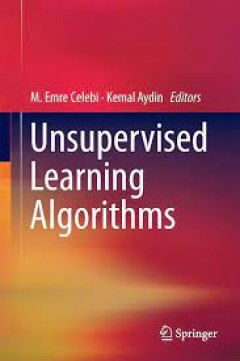
Unsupervised Learning Algorithms
This book summarizes the state-of-the-art in unsupervised learning. The contributors discuss how with the proliferation of massive amounts of unlabeled data, unsupervised learning algorithms, which can automatically discover interesting and useful patterns in such data, have gained popularity among researchers and practitioners. The authors outline how these algorithms have found numerous appli…
- Edition
- -
- ISBN/ISSN
- 978-3-319-24211-8
- Collation
- -
- Series Title
- -
- Call Number
- -
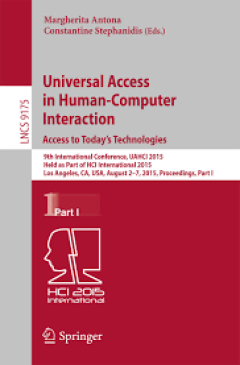
Universal Access in Human-Computer Interaction. Access to the Human Environme…
The four LNCS volume set 9175-9178 constitutes the refereed proceedings of the 9th International Conference on Learning and Collaboration Technologies, UAHCI 2015, held as part of the 17th International Conference on Human-Computer Interaction, HCII 2015, in Los Angeles, CA, USA in August 2015, jointly with 15 other thematically similar conferences. The total of 1462 papers and 246 posters pres…
- Edition
- -
- ISBN/ISSN
- 978-3-319-20687-5
- Collation
- -
- Series Title
- -
- Call Number
- -
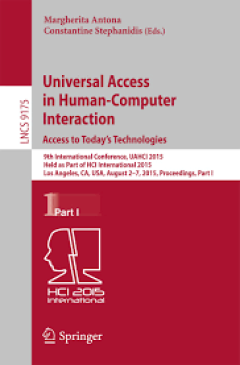
Universal Access in Human-Computer Interaction. Access to Today's Technologie…
The four LNCS volume set 9175-9178 constitutes the refereed proceedings of the 9th International Conference on Learning and Collaboration Technologies, UAHCI 2015, held as part of the 17th International Conference on Human-Computer Interaction, HCII 2015, in Los Angeles, CA, USA in August 2015, jointly with 15 other thematically similar conferences. The total of 1462 papers and 246 posters pres…
- Edition
- -
- ISBN/ISSN
- 978-3-319-20678-3
- Collation
- -
- Series Title
- -
- Call Number
- -
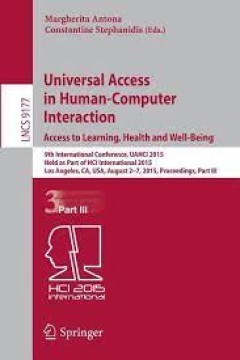
Universal Access in Human-Computer Interaction. Access to Learning, Health an…
The four LNCS volume set 9175-9178 constitutes the refereed proceedings of the 9th International Conference on Learning and Collaboration Technologies, UAHCI 2015, held as part of the 17th International Conference on Human-Computer Interaction, HCII 2015, in Los Angeles, CA, USA in August 2015, jointly with 15 other thematically similar conferences. The total of 1462 papers and 246 posters pres…
- Edition
- -
- ISBN/ISSN
- 978-3-319-20684-4
- Collation
- -
- Series Title
- -
- Call Number
- -
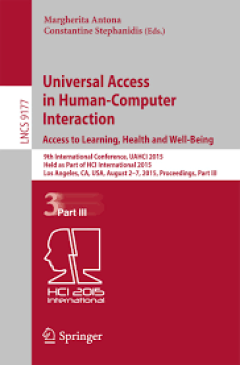
Universal Access in Human-Computer Interaction. Access to Interaction 9th In…
The four LNCS volume set 9175-9178 constitutes the refereed proceedings of the 9th International Conference on Learning and Collaboration Technologies, UAHCI 2015, held as part of the 17th International Conference on Human-Computer Interaction, HCII 2015, in Los Angeles, CA, USA in August 2015, jointly with 15 other thematically similar conferences. The total of 1462 papers and 246 posters pres…
- Edition
- -
- ISBN/ISSN
- 978-3-319-20681-3
- Collation
- -
- Series Title
- -
- Call Number
- -

Information and Knowledge Organisation in Digital Humanities
ABSTRACT Information and Knowledge Organisation explores the role of knowledge organisation in the digital humanities. By focusing on how information is described, represented and organised in both research and practice, this work furthers the transdisciplinary nature of digital humanities. Including contributions from Asia, Australia, Europe, North America and the Middle East, the volume e…
- Edition
- -
- ISBN/ISSN
- 9781003131816
- Collation
- -
- Series Title
- -
- Call Number
- -
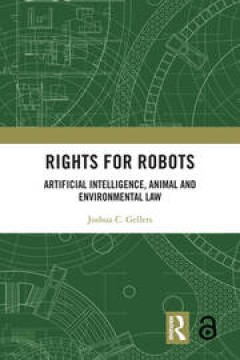
Rights for Robots
ABSTRACT Bringing a unique perspective to the burgeoning ethical and legal issues surrounding the presence of artificial intelligence in our daily lives, the book uses theory and practice on animal rights and the rights of nature to assess the status of robots. Through extensive philosophical and legal analyses, the book explores how rights can be applied to nonhuman entities. This task is …
- Edition
- -
- ISBN/ISSN
- 9780429288159
- Collation
- -
- Series Title
- -
- Call Number
- 004.1

Computer algebra and polynomials : applications of algebra and number theory
Algebra and number theory have always been counted among the most beautiful mathematical areas with deep proofs and elegant results. However, for a long time they were not considered that important in view of the lack of real-life applications. This has dramatically changed: nowadays we find applications of algebra and number theory frequently in our daily life. This book focuses on the theory …
- Edition
- -
- ISBN/ISSN
- 9783319150819
- Collation
- ix, 213 pages
- Series Title
- -
- Call Number
- 004

Computer algebra in scientific computing : 17th International Workshop, CASC …
This book constitutes the proceedings of the 17th International Workshop on Computer Algebra in Scientific Computing, CASC 2015, held in Aachen, Germany, in September 2015. The 35 full papers presented in this volume were carefully reviewed and selected from 42 submissions. They deal with the ongoing progress both in theoretical computer algebra and its expanding applications. New and closer in…
- Edition
- -
- ISBN/ISSN
- 9783319240213
- Collation
- xiii, 494 pages
- Series Title
- -
- Call Number
- 004

Image analysis and recognition : 16th International Conference, ICIAR 2019, W…
This two-volume set LNCS 11662 and 11663 constitutes the refereed proceedings of the 16th International Conference on Image Analysis and Recognition, ICIAR 2019, held in Waterloo, ON, Canada, in August 2019. The 58 full papers presented together with 24 short and 2 poster papers were carefully reviewed and selected from 142 submissions. The papers are organized in the following topical sections…
- Edition
- -
- ISBN/ISSN
- 9783030272722
- Collation
- xxii, 487 pages
- Series Title
- -
- Call Number
- 004
 Computer Science, Information & General Works
Computer Science, Information & General Works  Philosophy & Psychology
Philosophy & Psychology  Religion
Religion  Social Sciences
Social Sciences  Language
Language  Pure Science
Pure Science  Applied Sciences
Applied Sciences  Art & Recreation
Art & Recreation  Literature
Literature  History & Geography
History & Geography